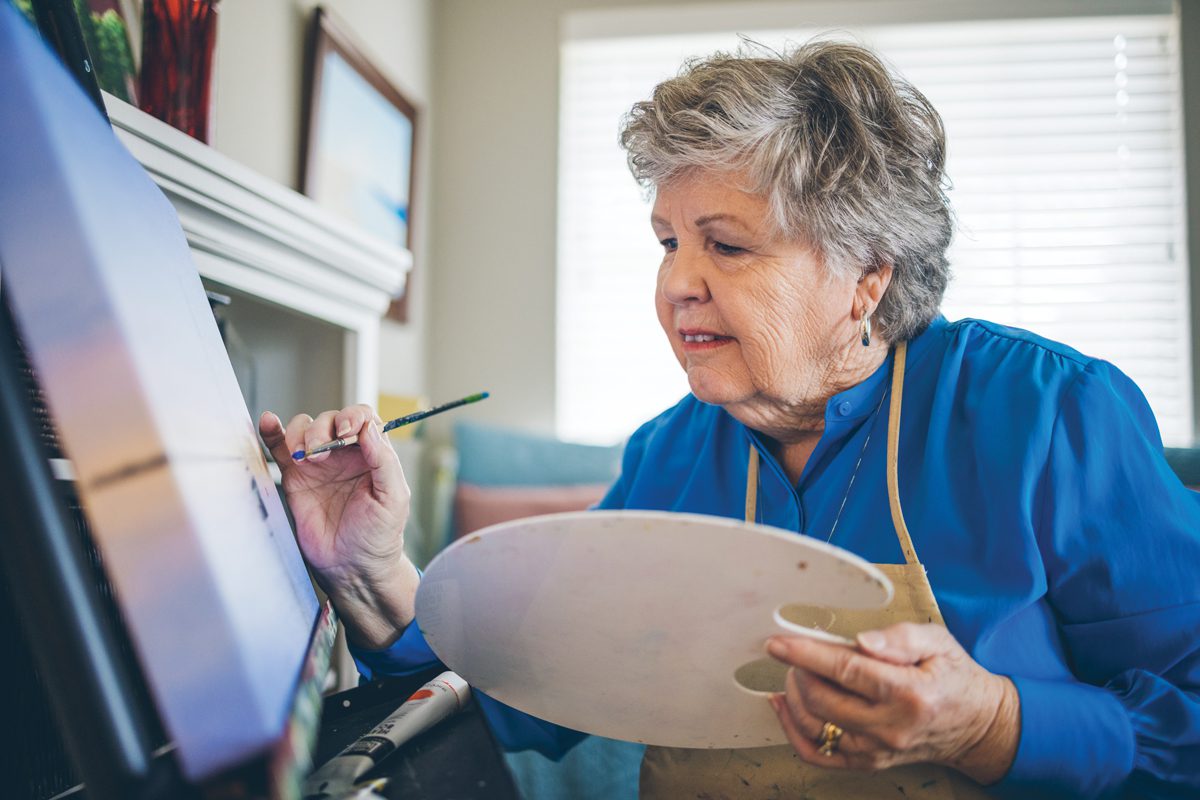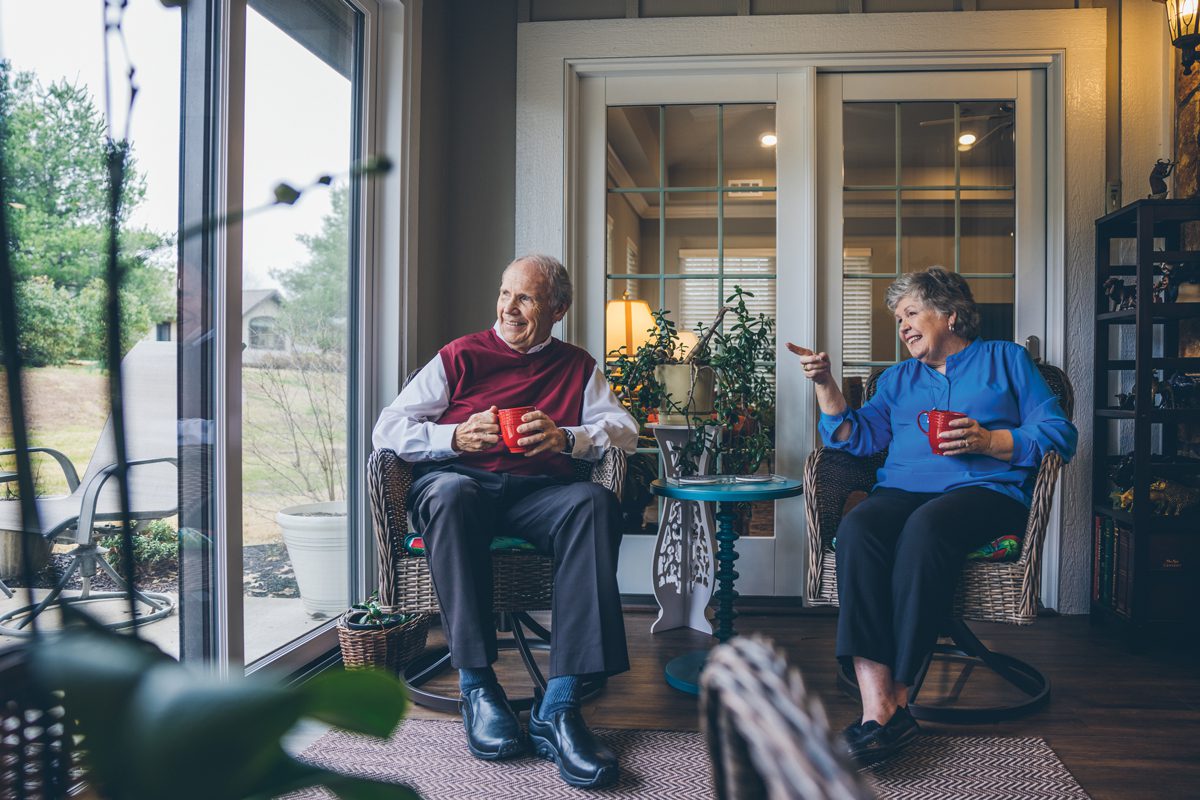There really wasn’t a time Otto and Betty Loewer didn’t know each other. They grew up in the same east Arkansas farming community and have been friends as long as they can remember.
A strong sense of community was instilled during their youth in Cross County. Between school and church, everyone knew everyone — and took care of one another — in the close-knit community. They felt safe, supported and protected.
Betty was 4 and her sister was 10 when their family moved near Wynne after their father purchased a rice and soybean farm. Betty spent much of the time with her dog and a book. She enjoyed working puzzles, building dollhouses from cardboard, climbing trees and wading in creeks.
Otto’s dad had moved from Louisiana to the rural Fair Oaks community, where he forged a rice, soybean and cattle farm out of swampy forested land. His dad also met his mom, secretary for the U of A Cooperative Extension County Agent in St. Francis County. Together, they raised three sons and also operated a successful seed-processing business. And they were named Farm Family of the Year at least once.
Otto, the oldest son, picked cotton for a neighbor at age 10 and soon was driving a farm tractor. When he was in eighth grade, Betty’s family moved just a mile down the road, and they rode the same school bus 15 miles to Wynne High School and talked to each other endlessly.
At their high school, students could letter in scholarship as well as sports. Otto still has silver dollars awarded to him for his 4-H Club activity. He also played football and sang in choir and was an honor graduate in 1963. In high school, Betty was involved with choir, student council and the school newspaper, as editor, and also was an honor graduate in 1964 and studied vocal music.
Otto and Betty’s families had attended the same church in Wynne, and they carpooled to Vacation Bible School during elementary school. By high school, she considered him her best friend. The story goes, he told a buddy one day in the school cafeteria that he thought he would marry Betty someday. And, when Otto went off to college, Betty realized she was losing her best friend.

BUILDING A LIFE TOGETHER
Though many assumed Otto would continue working the family farm after high school, he had another life in mind. With his dad’s Louisiana roots, attending Louisiana State University appealed to Otto. He attended Ouachita Baptist University for one year before transferring to LSU in 1964 for an agricultural engineering degree. He and Betty dated and got married in 1966, after her sophomore year at Ouachita Baptist University. After joining him in Baton Rouge, she was a secretary in the agronomy department for three years.
Otto received a commission as a Second Lieutenant in the U.S. Army but got a deferment to go to graduate school. In 1970, after completing his master’s degree in agricultural engineering, he left LSU with his sights set on becoming a college professor.
During these years, they also welcomed two daughters, Cynthia and Sarah. Betty spent time with their daughters and worked part-time while her career took a back seat, but she would eventually finish her college degree.
Following Army Officers Basic School, Otto got his Ph.D. in agricultural engineering at Purdue University in 1973. Several years later he obtained a master’s degree in agricultural economics at Michigan State University.
For Otto’s first faculty position at University of Kentucky, he was on the front end of computer technology. Betty managed and later bought a copy/printing business near the university campus – in the days before personal computers. Otto also got the chance to be a project consultant in Brazil; the entire family lived there for three months, and Betty homeschooled the girls.

RETURNING TO ARKANSAS
Otto’s next position, as department head for what is now the Department of Biological and Agricultural Engineering at the University of Arkansas, is what brought the family to Fayetteville for the first time in 1985. He helped with what was a nationwide transition from agricultural engineering to biological engineering, as well as the major renovation of what is now John White Jr. Engineering Hall.
Betty decided to get an interior design degree at the U of A. She’d always been able to think creatively and problem-solve in three dimensions. In high school, she’d considered architecture, but said it was nearly impossible for a woman to be accepted into that program in the early 1960s. Having “found my passion,” Betty soon got a job after graduation at an architectural firm. There, she worked on the planning and interior design for the current Washington County Courthouse when the building was brand new.
They next moved south, where Otto had a similar department chair role at the University of Florida. Betty worked in the university’s facilities planning department to creatively solve space issues.
They were happily pulled back to Fayetteville in 1996 for Otto to become dean of the U of A’s College of Engineering. He envisioned the college becoming a major driver for economic development in the state. While there, the Arkansas Research
and Technology Park was created from previous programs.
Then, as founding director of the U of A Economic Development Institute, Otto connected the campus to the people of the state. He helped create two multi-county economic development coalitions and also brought five Delta community colleges into partnership to secure significant funding for workforce development.
Started by the Institute, the Students Engaged in Economic Development (SEED) program connected professors and students at the U of A with communities throughout the state. Students
worked on real-world community projects, such as one where Betty brought her interior design students to help as she and Otto had the chance to work together.
Betty taught half-time in the U of A interior design program for 10 years. For this SEED project, her class worked with clients in the community to do an adaptive reuse design for an empty Kmart building in their former hometown of Wynne. Students provided conceptual designs for a revitalized space to serve as a multi-use community building presently known as the Technology Center for the Delta, a widely used facility.
And at 64, Otto began teaching graduate courses at the U of A, which he continued for 12 years before retiring in 2021. For one of those courses, Linkages Among Technology, Economics and Societal Values, he wrote the textbook. He considers this course his most significant career contribution.
After she retired from teaching in 2006, Betty returned to painting again and volunteered with Cooperative Emergency Outreach, which provides food and other assistance to families in need. And she and Otto found more time to travel. They’ve been to all of the United States, gone on several cruises and visited some 40 countries — something they never envisioned while growing up in rural east Arkansas. And they still talk to each other endlessly.

FINDING COMMUNITY
The Loewers were attracted to Butterfield Trail Village for its comprehensive health care because they didn’t want to be a burden to their children and family as they aged. And the same sense of community that was important in their youth is something they’ve found at BTV.
Once at BTV, they realized that living there is much like being on a cruise ship that never leaves port. Nearly every imaginable amenity is available, and it is its own supportive community. They’ve enjoyed renewing old friendships and making new ones, often over the dinner table.
“They take care of the things that you don’t need to be doing,” Betty said. “That makes living older a lot easier.”
They were in the Carriage Club for more than four years before they finally moved into their Village Home in late 2019. It had been gutted, so they started with a blank canvas. Betty designed their space, eking out extra storage and usable space by the inches.
They’d downsized a lot, giving away about 1,500 books, but were able to bring the important things, including porcelain birds sculpted by Betty’s mother and their most comfortable furniture.
In her redesign, Betty added two sections of built-in shelving to a wall in the dining area, leaving just enough space between to fit her piano. In the kitchen, she added a work station for herself and an island to keep the space open. They also enclosed a covered, tiled outdoor area to create a sunroom.
They enjoy watching Razorback sports and uplifting Hallmark-type movies together. He reads historical novels, while she also likes mysteries, biographies and political intrigue. He’s a big fan of pecan pie, which Betty makes during the holidays.
Their daughters live in Fayetteville and St. Petersburg, Florida, and they have seven grandchildren and one great-grandson.
Otto participates in a monthly jam-singalong with fellow residents and continues to enhance his guitar skills through online lessons. He regularly walks on the nearby trail, aiming for 20 miles a week, and uses the gym.
Betty is still happy to see him walk through the door after his golf game and tells him she loves him every day. Otto returns the comment.
They’ve often talked about one’s choices in life, and the impact of a right or left turn. A single decision propels one along a particular path.
“There are life-changing moments,” Otto said, “and sometimes they work out, and sometimes they don’t.”
“You don’t realize it at the time,” Betty said. “You don’t always know it until you look back and say, ‘Wow, I chose A instead of B, and look what happened.’”
“We basically won the lottery of life, I think, for so many things,” Otto said. “We’re appreciative because we know it doesn’t always work out that way.”
